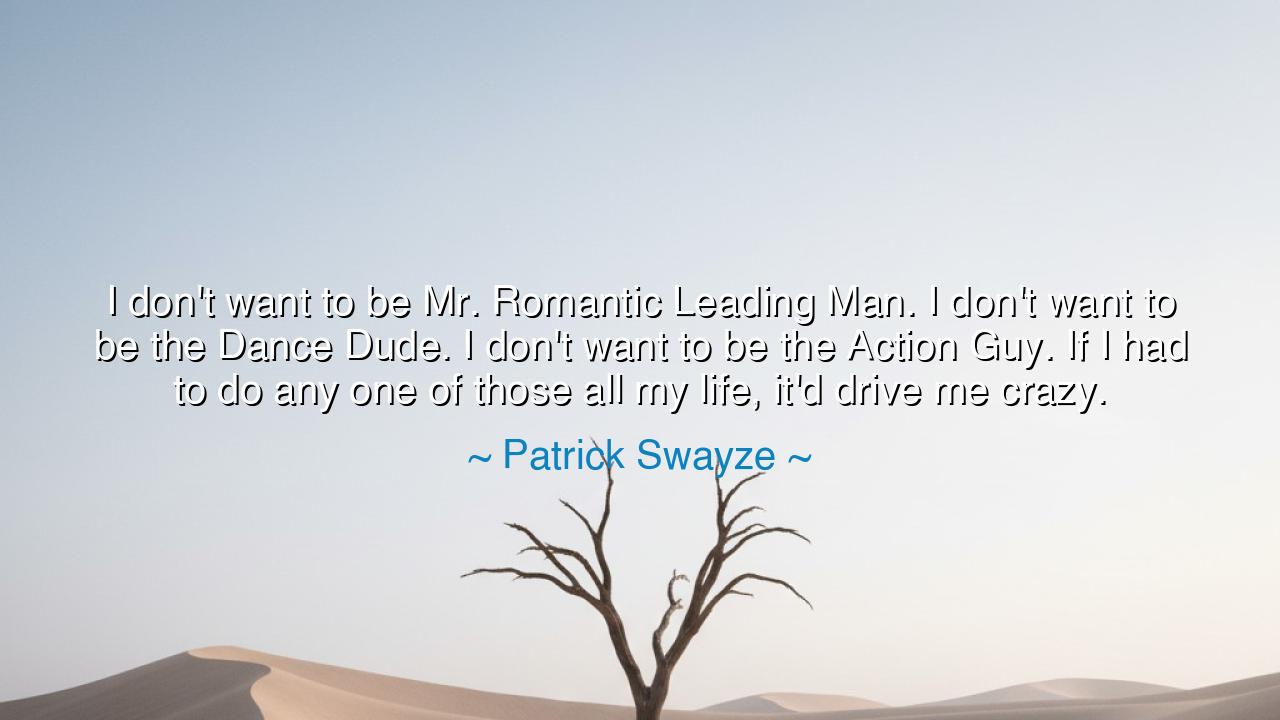
I don't want to be Mr. Romantic Leading Man. I don't want to be
I don't want to be Mr. Romantic Leading Man. I don't want to be the Dance Dude. I don't want to be the Action Guy. If I had to do any one of those all my life, it'd drive me crazy.






Hear the cry of Patrick Swayze, who declared with passion: “I don’t want to be Mr. Romantic Leading Man. I don’t want to be the Dance Dude. I don’t want to be the Action Guy. If I had to do any one of those all my life, it’d drive me crazy.” These words, though spoken by an actor of our age, strike like the voice of a prophet. They are not merely about cinema, but about the condition of every human soul. For they speak of the peril of being caged by expectation, of being reduced to a single role, when within us burns a multitude of selves.
The world is eager to label. It sees a man excel in one realm and proclaims, “This is who you are forever.” To Swayze, who conquered audiences as the romantic leading man in Ghost, as the dance icon in Dirty Dancing, and as the action hero in Point Break, the danger was clear: success itself becomes a trap. The world praises, but in its praise it builds a prison. He did not reject these roles because they were unworthy, but because they were incomplete. The human spirit, he knew, is vast, and to confine it is to suffocate it.
This struggle is ancient. Consider the story of Alexander the Great. He was hailed as the conqueror of nations, the mighty general who subdued the known world. Yet in his heart, he longed to be philosopher, explorer, and student of Aristotle’s wisdom. But history chained him to his crown of war. He conquered worlds, yet died unsatisfied, for he was known only as the warrior. The truth of Swayze’s words resounds here: to live as one thing alone, no matter how glorious, is to deny the fullness of what one might be.
The lesson is also found in the life of Leonardo da Vinci. Had he accepted only one mask, he might have been remembered merely as a painter, or as an inventor, or as a dreamer of flight. But he refused to be one thing alone. He pursued art and science, anatomy and music, painting and philosophy. He lived as a man of many selves, and it is for this reason that his name endures as the symbol of human possibility. Swayze’s resistance to labels echoes this same wisdom: greatness is not to be one thing, but to embrace the fullness of many things.
And so the actor teaches us: beware of the roles others assign you. To be called the Romantic, the Dancer, the Action Hero may bring applause, but applause can blind the heart. True freedom lies in exploring beyond the mask, in daring to surprise the world with new faces, new talents, new depths. For the greatest tragedy is not failure—it is to succeed in becoming what others expect, and never discover who you truly are.
What, then, shall we learn? We must live courageously, refusing to be reduced to one title. Let the scholar also paint, let the warrior also write poetry, let the parent also dream of adventure. Do not fear contradiction; embrace it, for the soul is wide enough to contain all things. Life is not a single song, but a symphony. To live it fully, we must play not one note, but many.
Therefore, children of tomorrow, heed the teaching of Patrick Swayze: do not let the world chain you to one mask, however beloved. Be willing to cast aside titles, to risk misunderstanding, to reach for the uncharted realms of your own being. For only in this way will you avoid the madness of repetition, and instead taste the wholeness of life.
Thus his words, spoken with the simplicity of honesty, become a commandment: refuse to be one thing alone. Be vast. Be many. Be human.






AAdministratorAdministrator
Welcome, honored guests. Please leave a comment, we will respond soon